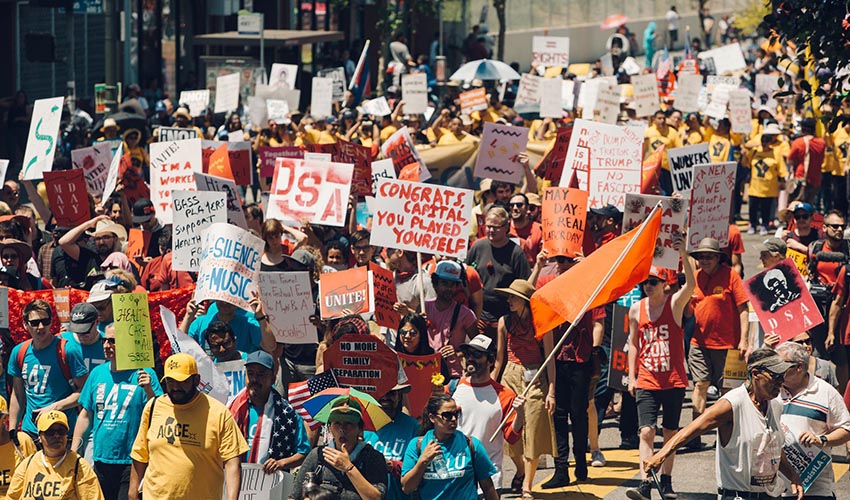Image: Workers hold a May Day strike in Los Angeles in 2017. Photo Credit: (CC BY 2.0)
Poor pay, poor conditions and lack of care has dogged e-com giant Amazon for years. This week workers in the US have gone on strike. Support for the industrial action is growing across the UK; but is Amazon too big to be reckoned with?
In 2019, word got out that Amazon warehouse workers weren’t being given sufficient break time. This came with all kinds of problems, but the most glaring is that they were forced to pee in bottles on the warehouse floor. As a result of those infractions, there have been so many scandals that Amazon has found itself on the National Council for Occupational Safety and Health’s 2019 Dirty Dozen list, which highlights the most dangerous companies to work for, joining the ranks of Facebook and McDonald’s.
The controversy led to a series of strikes in Milton Keynes. They also took place in Doncaster, Warrington, and Coventry, among other places across the UK. But there was another catalyst for these events, too: in September 2018, a 48-year-old Amazon warehouse worker in Ohio died of a heart attack on the warehouse floor. He was there for twenty minutes before Amazon’s internal safety officers arrived to help him, a statement from his brother argues. By then it was too late; CPR was administered, but Billy Foister never recovered.
Although Billy Foister was an American citizen, the death sparked worker strikes in the UK. But for Amazon, these strikes were little more than a drop in the ocean: according to Business Insider, Amazon turns a profit of $215,068,493 every day, around $2,500 dollars every second.
This year, a group of Alabama-based Amazon warehouse workers, led by a union formed in Amazon’s BHM1 warehouse, have started the most significant union battle with Amazon in the company’s history, spanning the week from 7 March to 13 March. The battle has been supported widely on social media. Sites like Twitter and TikTok are awash with young people taking action against the company through refusing to cross the digital picket line. It has also driven so much online traffic to Amazon’s anti-union website, Do It Without Dues, that it is unavailable to people who might access it with the intention of sabotaging unions.
@puppospraxis Send a report or 100. #amazonunion #directaction #classwar #solidarity #sabotage #workingclass #iww #anarchist #socialist #communist #amazon #strike
BHM1 is an Amazon warehouse in Bessemer, Alabama, where employees are expected to pick up 400 delivery items per hour, or 2,500 per day. An anonymous Amazon employee told progressive American news site, The Prospect: “It’s kind of impossible to hit rates, we just do the best we can. If we don’t meet rates, we get threatened to get demoted to the position where we started… they threaten you, or you can get fired”.
The Do it without Dues site is relatively straight-forward: it’s a simple, scrollable page which lists a series of reasons that joining a union is bad, citing the $500 joining fee as extortionate.
“HEY BMH1 DOERS, why pay almost $500 dollars in dues? We’ve got you covered with high wages, health care, vision and dental benefits, as well as a safety committee and an appeals process,” the website says.
Those benefits only apply to full-time employees.
Later on, the website says: “If you’re paying dues… it will be RESTRICTIVE meaning it won’t be as easy to be as helpful and social with each other. So be a DOER, stay friendly and get things done versus paying dues.”
Amazon has been known to pay less tax than it should. In the financial year 2019-2020, Amazon only paid £6.3 million in corporation tax on £13.55 billion in sales. In the same year, supermarket chain M&S paid £65.4 million in corporation tax, while Tesco and John Lewis paid £176 million and £42 million respectively. Both Amazon and Tesco operate in 13 countries. M&S operates in 29 countries and also operates stores in Hong Kong. All of these facts lead to labour strikes having a diminished effect – if one Amazon warehouse shuts down, the others will mitigate the loss caused by one gap in worker productivity.
Let me congratulate the workers at Amazon for having the incredible courage to stand up and to fight for a union. The fight you are waging will send a message to workers all across the country that if they stand up, stand together, and fight, they can win. pic.twitter.com/7cG5v6elCb
— Bernie Sanders (@BernieSanders) February 24, 2021
But despite Amazon’s efforts, the union workers have found support in both their fellow workers and other celebrities. Rage Against the Machine guitarist Tom Morello recorded a short video calling the Amazon union battle “the David and Goliath workers’ rights story of the 21st century”.
Morello is a member of the Los Angeles’ Local 47 Musicians Union, The Industrial Workers of the World, and is an honorary member of the Air Traffic Controller’s Union and the Teamsters. This sentiment was echoed by other popular musicians such as Run the Jewels’ Killer Mike.
Amazon workers in Alabama felt disrespected and unsafe and so they are trying to form a union. This election for 5,800 mostly Black workers in Alabama up against such a huge and predatory corporation as @Amazon is the David and Goliath workers' rights story of the 21st Century. pic.twitter.com/PpJ2eGd1BY
— Tom Morello (@tmorello) March 6, 2021
Unions have also gotten involved in the struggle of Britain’s Amazon warehouse workers. The workers’ rights group Unite West Midlands have taken to the streets in protest of the ecommerce giant. On May 19 2021, they occupied a bridge in Worcester, brandishing a sign stating: “Stop the Exploitation.”
Unite executive officer Sharon Graham said: “Unite has recently written to Jeff Bezos in response to claims from the company about respecting UK workers’ rights to join and form a union. Our union is calling on the company to make a clear commitment and sign up to a declaration of neutrality. The declaration would guarantee workers the freedom to talk with and form a union without fear. If the company is genuine then it should be more than happy to sign the declaration.”
An Amazon spokesperson said: “We respect our employees’ right to join, form, or not to join a labour union or other lawful organisation of their own selection, without fear of reprisal, intimidation, or harassment. Across Amazon, including in our fulfilment centres, we place enormous value on having daily conversations with each team member and work to make sure direct engagement with our employees is a strong part of our work culture.”
The battle between Amazon and its workers looks set to continue for the foreseeable future. The Alabama strike is due to run from the 7th March until the 13th March, a time during which the unionised workers request that people refrain from buying products from Amazon.



